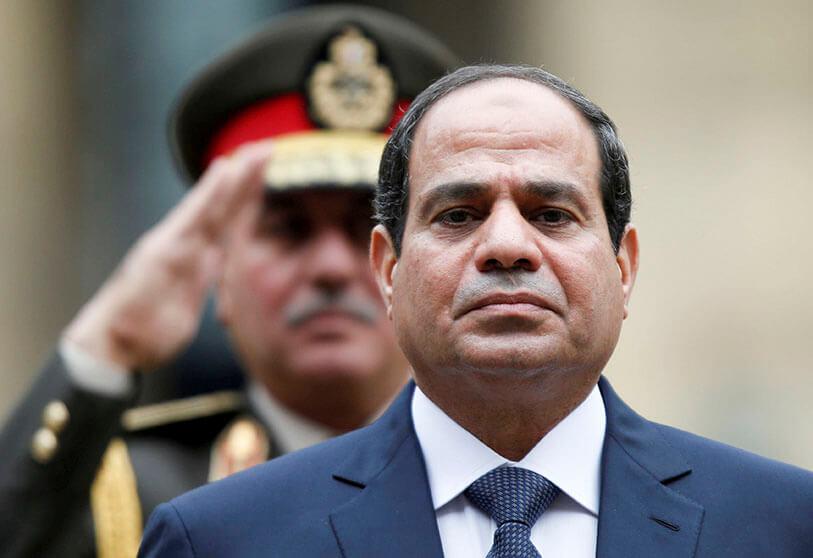Egypt-Turkey conflict: Bluff or real war?

Photo: Abdul Fattah al-Sisi / Reuters
Since mid-June, the Egyptian army has been gathering large numbers of troops along the country's border with Libya. In parallel, Cairo called for an emergency meeting of the Arab League and was fully supported by its member states. It is reported that Cairo's Gulf allies - the United Arab Emirates and Saudi Arabia pressured to act. On June 20, President Abdul Fattah al-Sisi declared the cities of Sirte and Jufra in Libya as a red line and warned that the Egyptian army would intervene if military operations were to be carried out there.
Turkey's Sirte and Jufra plan of action
It is known that this covert warning was given to Turkey, which has recently tilted the situation in Libya in its favor. City of Sirte, on the shores of the Gulf of Sidra, and Jufra in the south are of strategic importance to Ankara. First, Jufra has rich oil reserves that are transported to Europe from the ports in the Gulf of Sidra. The second is related to Plan B of Khalifa Haftar's foreign supporters, which envisage the division of Libya into two states. According to this plan, the cities of Sirte and Jufra must remain under the control of Haftar. Turkey's Libyan borders in the Mediterranean Sea pass through the Gulf of Sidra, and if a new state is created here, then Turkey's Libyan strategy, recent successes, and the Exclusive Economic Zone (EEZ) agreement, which was signed with the Tripoli government will be of no use. In this case, Turkey will have naval borders only with a new state in eastern Libya, which will make reaching a similar agreement there almost impossible. So, the failure of diplomatic talks, in this case, will force Ankara to launch the Sirte-Jufra operation. Sisi's last warning was made bearing in mind exactly this scenario. In fact, Egypt's accession to the EEZ agreement between Turkey and Libya should be considered more beneficial for Cairo, since the latter may gain from it 10,000 square kilometers more of sea area than its share in the expected EEZ agreement with Greece. However, Egypt's interests in the Libyan conflict are ultimately tied to geopolitical factors rather than economic matters.
Regional interests of Egypt
The Egyptian president's warning was indirectly addressed to Russia, besides Turkey. After the recent defeats, Khalifa Haftar has firmly fallen under the influence of the Kremlin. The Egyptian government believes that Russia and Turkey are trying to create a "new Syria" in the region, and Cairo does not want to remain a bystander in this process. After the Arab Spring, Egypt and other North African countries failed to ensure socio-political stability, and the escalation of the Libyan conflict in Libya could produce a domino effect in the region. Nevertheless, it should be mentioned that as a result of the Sisi government's foreign policy line, the country has got tied with the interests of the Gulf monarchies, which now limits Cairo's maneuverability. On top of that, the Sisi government's domestic stance remains rather fragile, which is forcing his regime to be more cautious.
Internal issues of the Sisi regime
Sisi came to power through a military coup and his regime was initially boosted by the United States, Israel, and the Gulf states. However, Sisi does have weak socio-ideological grounds in the country; he, therefore, tries to fill in this gap with the image of a secular Arab nationalist, by launching a campaign against Islamist groups, mostly the Muslim Brotherhood. Despite the government's harsh repressions against MB, the organization remains very popular among the Egyptian public. The offensive against Turkey, the MB's biggest supporter, could lead to large-scale internal protests capable of jeopardizing the future of the Sisi regime.
Besides, Sisi's warm relations with the United States and Israel, and his willingness to act upon the wishes of the Gulf states, have sharply increased distrust of his regime among most societal groups. It suffices to mention that in 2017, the Sisi government sold the Egyptian Red Sea islands of Tiran and Sanafir to Saudi Arabia in exchange for financial aid. Furthermore, internal issues such as the country's economic decline, the threat posed by ISIS in the Sinai Peninsula and the dispute with Ethiopia over the Nile River have increased general dissatisfaction with the Sisi government. In particular, if the Ethiopian dam on the Blue Nile becomes operational, the Nile River basin, the major source of water for the 100 million-strong Egyptian population, will shrink significantly, ultimately leading to a severe drought and a food crisis. It must be taken into account that Turkey is already providing active support for Ethiopia and diplomatic talks between the two countries have intensified. In this case, ignoring the country's primary problems and acting at the behest of the West and the Gulf countries, will significantly increase dissatisfaction against the Sisi regime.
It should also be noted that the army has a great reputation in Egyptian society and has a say in every sector, from economics to politics. That’s why back in 2013, the coup d'état orchestrated by Sisi was met with optimism by the public. However, his actions according to interests of the West, rather than Egypt's national interests, dealt a serious blow to his reputation among the political and military elite. To prevent a new military coup, Sisi launched "a great purge" in the army, neutralizing “probably disloyal" generals. Nonetheless, coups are usually carried out by trustworthy persons, and an unforeseeable adventure in Libya could lead to a new military coup attempt, this time against Sisi himself.
Conclusion
Given all this, the Sisi government would better take a more careful line in the Libyan conflict not to harm Egyptian national interests. However, there are strong suspicions that Sisi usually acts upon the desires of the Israeli and Gulf monarchies, rather than on the interests of Egypt. In the current situation, if Turkey starts operations on the Sirte-Jufra line, the Egyptian Army will likely intervene. That is why Turkey would not like to provoke Egypt, equipped with modern weapons and a powerful air fleet, to take a direct part in the Libyan conflict.
I think that Washington's position will play a decisive role in this confrontation. The United States is still taking a neutral stance. It is crystal clear that the United States is concerned about Russia's deployment in Libya through Haftar and Egypt is supporting for Haftar front. In return, the fact that Turkey's regional activities run counter to the interests of France and the Gulf states, especially Israel, is not in line with Washington's wishes. At the same time, the United States does not want to take sides between the two regional allies. You might remember that American support for the Kurds in Syria was one of the triggers for Turkey’s rapprochement with Russia. Thus, Washington’s involvement in the conflict on any of the sides will be a powerful motive for the other one to reach out to Russia. In particular, the Turkish government's efforts within this context should be highlighted. On June 9, after a telephone conversation with U.S. President Donald Trump Turkey President Recep Tayyip Erdogan's statement of "an agreement with the U.S. has been reached on Libya" is noteworthy. Also, the postponement of the "Libya meeting" between Turkish and Russian delegates last week could be evaluated as Ankara's "message" to Washington.
It is most likely that both parties will not risk an open confrontation until the U.S. position is clear. Egypt's intervention in Libya could lead to internal social protests against Sisi or a military coup attempt, so the Egyptian leader will seek full support from Washington before intervening. At the same time, the Turkish government does not want the U.S. and the West to further squeeze its weakening economic situation during the pandemic, so at least neutrality on the part of Washington will be sufficient for Ankara. The recent social and political crisis in the United States has been delaying the Trump administration from taking significant steps in foreign policy. This situation gives an additional advantage for Turkey, and Ankara will try to use it timely.







